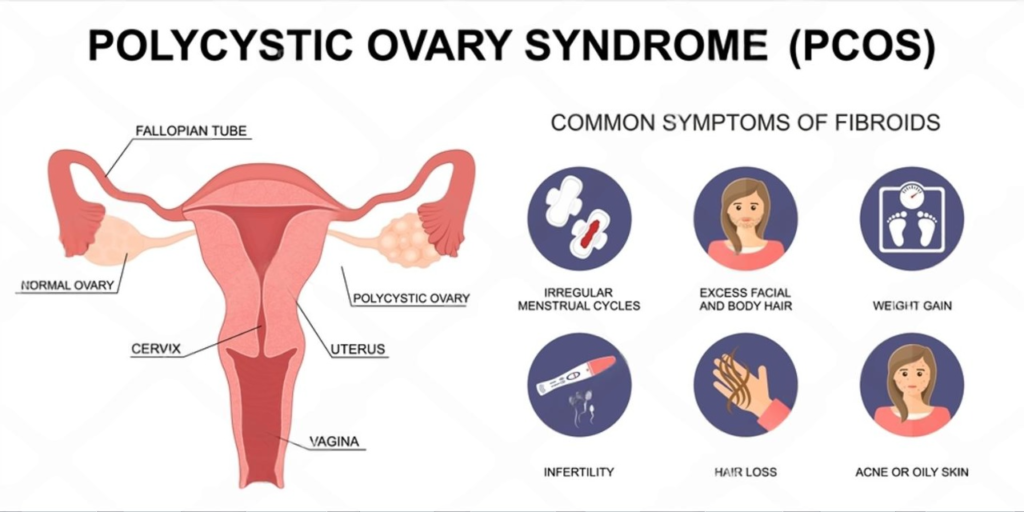The teenage years bring an overwhelming wave of changes — from emotional shifts to physical developments. But sometimes, unusual symptoms can hint at deeper underlying health concerns. One such condition that often emerges during adolescence is Polycystic Ovary Syndrome (PCOS). Identifying the early signs of PCOS symptoms in teens is important for early intervention and improved long-term health outcomes.
Let’s break down what parents, guardians, and teenagers themselves should watch out for, and why early diagnosis can make a world of difference.
Understanding PCOS symptoms in teens
PCOS is a hormonal condition that impacts ovarian function. It can cause irregular periods, elevated levels of male hormones (androgens), and the development of small cysts on the ovaries. While commonly diagnosed in women in their twenties and thirties, it often starts much earlier — during the teen years.
In fact, PCOS symptoms in teens can be easily mistaken for normal puberty changes, which makes awareness even more important. Many parents often ask, “What are the first signs of PCOS in teenager?” The truth is that symptoms like irregular cycles, sudden acne, or unwanted hair growth may appear early but often get dismissed as part of growing up.
Early Signs of PCOS Every Teen Should Know
The teenage years bring an overwhelming wave of changes — from emotional shifts to physical developments. But sometimes, unusual signs can hint at deeper underlying health concerns. One such condition that often emerges during adolescence is Polycystic Ovary Syndrome (PCOS). Identifying the first signs of PCOS in teens is important for early intervention and improved long-term health outcomes.
Let’s break down what parents, guardians, and teenagers themselves should watch out for, and why early diagnosis can make a world of difference.
1. Irregular or Missed Periods
Irregular menstruation is one of the most prominent early signs of PCOS. While it’s normal for periods to be a bit unpredictable during the first year or two after they begin, persistent irregularities can signal a problem. Skipping periods, having extremely heavy bleeding, or long cycles exceeding 45 days may point toward PCOS.
2. Excessive Acne
Acne is common in teenagers, but unusually severe or persistent acne — especially on the lower face, jawline, and upper back — can be a red flag. Elevated androgen levels in PCOS lead to increased oil production, clogging pores and causing inflammation.
3. Unwanted Hair Growth (Hirsutism)
Another key indicator is excessive hair growth in areas where males typically grow hair, like the upper lip, chin, chest, or back. This happens due to elevated androgen levels and is one of the classic signs that should not be ignored.
If you notice your teenager struggling with unexpected hair growth patterns, it’s wise to consult a gynaecologist specialist London who can guide you through the next steps.
4. Weight Gain or Difficulty Losing Weight
Teens with PCOS often find it hard to maintain a healthy weight despite efforts to eat well and exercise. The hormonal imbalance affects the way the body processes insulin, making it easier to gain weight and harder to shed it.
Obesity can further worsen symptoms of PCOS, creating a vicious cycle — highlighting the importance of early lifestyle management.
5. Thinning Hair or Hair Loss
While PCOS can cause hair to grow excessively in some areas, it can also lead to thinning hair or noticeable hair loss from the scalp, resembling male-pattern baldness. This dual effect can be emotionally distressing for teenagers already navigating the pressures of adolescence.
6. Dark Patches of Skin (Acanthosis Nigricans)
Some girls with PCOS develop dark, velvety patches of skin, usually around the neck, underarms, or groin. This condition is often linked to insulin resistance — a hallmark feature of PCOS.
If you notice such skin changes, it’s wise to reach out to a pelvic pain clinic London that also specializes in hormonal disorders for proper diagnosis.
7. Pelvic Pain or Discomfort
Though less talked about, some teenage girls experience persistent pelvic pain, either around the time of ovulation or seemingly randomly. This could be related to the presence of cysts on the ovaries or hormonal fluctuations associated with PCOS.
Given how pelvic pain can have many causes, it’s important not to ignore these signs. Consulting a pelvic pain clinic in London can help pinpoint whether PCOS or another issue is to blame.
8. PCOS Symptoms in Unmarried Girls
Unmarried teenage girls may also show early warning signs such as missed periods, persistent acne, or unusual hair growth. These are not linked to marital status but rather to hormonal imbalance. Parents and teens should take these symptoms seriously and seek medical advice early.
Signs of PCOS vs Normal Puberty Changes
Distinguishing PCOS signs from normal teenage changes can be tricky. For example, while acne is common during puberty, severe and persistent breakouts around the jawline or back often indicate a deeper issue. Similarly, irregular periods are expected for the first couple of years, but skipping cycles for several months is not typical. Understanding these differences helps families decide when it’s time to see a doctor.
Why Early Diagnosis Matters
Early detection of PCOS symptoms in teens can significantly alter the course of the condition. Without intervention, PCOS can lead to complications like:
- Type 2 diabetes
- Fertility problems
- Sleep apnoea
- Depression and anxiety
- Heart disease later in life
Moreover, teenage girls dealing with symptoms like acne, unwanted hair, and weight issues may suffer from poor self-esteem. Timely medical support ensures they receive not just the right treatment, but also emotional reassurance.
How PCOS is Diagnosed in Teenagers
Diagnosing PCOS in teens can be tricky since many PCOS signs and symptoms overlap with normal puberty. However, a thorough evaluation by a gynaecologist specialist London typically includes:
- A detailed medical history review
- Physical examination
- Blood tests to check hormone levels
- Ultrasound to examine the ovaries
It’s important to note that not all teens with PCOS will have ovarian cysts. Diagnosis often relies more on hormonal patterns and symptoms rather than imaging alone.
If you’re unsure when to seek help, learning about your First Visit to Gynae can provide valuable insights into what to expect and highlight the importance of early consultations for maintaining reproductive health.
Managing PCOS in Teenage Girls
Although there is no definitive cure, pcos signs and symptoms can be effectively managed. Treatment options typically include:
- Lifestyle adjustments: A healthy diet, regular physical activity, and maintaining a balanced weight.
- Medications: Birth control pills to regulate periods, anti-androgens to reduce hair growth and acne, and metformin to address insulin resistance.
- Emotional support: Counselling or therapy can be invaluable for managing body image issues and emotional distress.
Early involvement of healthcare providers, especially those experienced with adolescent care, can empower young girls to live healthier, happier lives despite their diagnosis.
Conclusion
Spotting the first signs of PCOS in teens early can make a remarkable difference in long-term health, self-confidence, and fertility outcomes. Since PCOS symptoms often mimic normal adolescence, parents, guardians, and teens should stay attentive without jumping to conclusions. Awareness, early medical guidance, and compassionate care form the cornerstone of managing PCOS effectively.
If you notice any symptoms or simply want to ensure your teenager’s reproductive health is on track, connecting with specialists can provide clarity and support. Don’t wait for the symptoms to worsen — early action builds a healthier future.
At Well Women Clinic, experienced consultants are ready to guide teenagers and their families through PCOS diagnosis, management, and holistic care. From your first consultation to personalized treatment plans, their goal is to provide expert, compassionate care tailored to your needs.
FAQs: Signs of PCOS in Teens
PCOS is a hormonal condition that can affect menstrual health, skin, and weight in teenage girls. Early detection of pcos in teens helps reduce long-term risks and improve overall wellbeing.
Look for persistent signs like irregular periods, acne, unwanted facial hair, weight gain, or hair thinning. A visit to a gynaecologist specialist in London can help confirm the diagnosis through tests and physical exams.
PCOS does not usually go away on its own. While symptoms may improve with age or lifestyle changes, medical support is often necessary to manage long-term health risks.
PCOS symptoms can begin shortly after a girl gets her first period — typically between ages 12 and 16. The sooner it’s detected, the better the chances of managing it effectively.
You should book an appointment with a gynaecologist specialist London who has experience treating adolescents with hormonal imbalances like PCOS. At Well Women Clinic, our expert consultants provide comprehensive care tailored to teenage girls, ensuring early diagnosis and effective management of PCOS symptoms.
Yes, some irregularity is common in the first 1–2 years after menstruation begins. However, if your teen frequently skips periods or has very long cycles, it could be an early sign of PCOS in teenager.
The first signs often include irregular cycles, persistent acne, and hair growth in unusual areas. If these symptoms continue, medical consultation is important.
Unmarried girls may experience irregular cycles, acne, weight gain, or unwanted hair growth. These are not linked to marital status, but to hormonal imbalance, and should not be ignored.





